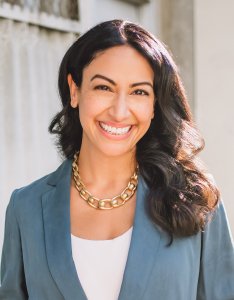Presented By: Center for Middle Eastern and North African Studies
CMENAS MLK Day Event. From the Beloved Community to the Umma: How Martin Luther King Jr.’s Legacy Shapes Muslim Americans’ Solidarity Politics
Hajar Yazdiha, assistant professor of sociology, University of Southern California

“I knew that I could never again raise my voice against the violence of the oppressed in the ghettos without having first spoken clearly to the greatest purveyor of violence in the world today -- my own government....”
-Martin Luther King, Jr.
Since 9/11 and the Global War on Terror, we have seen the racial projects of Islamophobia grow to dangerous ends, targeting Muslims and those who ‘appear’ Muslim as unassimilable Others to be surveilled, contained, and eliminated. At the same time, we have seen growing coalitions of diverse Muslim, Middle Eastern, and Arab Americans coming together to challenge anti-Muslim politics and the systems that legitimize them. These solidarity politics have found roots in the legacies of Dr. King and the Black freedom struggle. However, recognizing the interconnection between Muslim immigrants and Black Americans has been a longer and more complicated journey that offers us all lessons for the deep divides that face us today. This talk draws on archival data and focus groups to trace the strategic trajectory of Muslim American activism from histories of aspirational whiteness to futures of intersectional coalitions. Muslim activists progressed from early strategies centered on maintaining their distance from Black identity and history to eventual strategies that use the memory of Dr. King and the Civil Rights Movement as a cultural bridge, joining Muslim identity with Black identity in multiracial coalitions. What results from this new understanding of “who we are” is not only a reclamation of what it means to be American but also an emancipatory conception of what it means to belong to a human community across borders, boundaries, and time.
Hajar Yazdiha is an Assistant Professor of Sociology at the University of Southern California, a faculty affiliate of the USC Equity Research Institute, and a CIFAR Azrieli Global Scholar (2023-2025). Dr. Yazdiha received her Ph.D. in Sociology from the University of North Carolina, Chapel Hill. She researches the politics of inclusion and exclusion, examining the forces that bring us together and keep us apart as we work to forge collective futures. In addition to award-winning articles, she is author of the recent book, The Struggle for the People’s King: How Politics Transforms the Memory of the Civil Rights Movement (Princeton University Press). This book investigates the political misuses of the memory of civil rights and Dr. King to make sense of how distorting the past matters for our democracy today. Dr. Yazdiha is also a public scholar whose writing and research has been featured in outlets including The New York Times, LA Times, ABC News, The Hill, and USA Today. You can follow her at www.hajaryazdiha.com, on Instagram @ProfHajarYazdiha, and Twitter @HajYazdiha.
Register here: https://myumi.ch/n7RPm
-Martin Luther King, Jr.
Since 9/11 and the Global War on Terror, we have seen the racial projects of Islamophobia grow to dangerous ends, targeting Muslims and those who ‘appear’ Muslim as unassimilable Others to be surveilled, contained, and eliminated. At the same time, we have seen growing coalitions of diverse Muslim, Middle Eastern, and Arab Americans coming together to challenge anti-Muslim politics and the systems that legitimize them. These solidarity politics have found roots in the legacies of Dr. King and the Black freedom struggle. However, recognizing the interconnection between Muslim immigrants and Black Americans has been a longer and more complicated journey that offers us all lessons for the deep divides that face us today. This talk draws on archival data and focus groups to trace the strategic trajectory of Muslim American activism from histories of aspirational whiteness to futures of intersectional coalitions. Muslim activists progressed from early strategies centered on maintaining their distance from Black identity and history to eventual strategies that use the memory of Dr. King and the Civil Rights Movement as a cultural bridge, joining Muslim identity with Black identity in multiracial coalitions. What results from this new understanding of “who we are” is not only a reclamation of what it means to be American but also an emancipatory conception of what it means to belong to a human community across borders, boundaries, and time.
Hajar Yazdiha is an Assistant Professor of Sociology at the University of Southern California, a faculty affiliate of the USC Equity Research Institute, and a CIFAR Azrieli Global Scholar (2023-2025). Dr. Yazdiha received her Ph.D. in Sociology from the University of North Carolina, Chapel Hill. She researches the politics of inclusion and exclusion, examining the forces that bring us together and keep us apart as we work to forge collective futures. In addition to award-winning articles, she is author of the recent book, The Struggle for the People’s King: How Politics Transforms the Memory of the Civil Rights Movement (Princeton University Press). This book investigates the political misuses of the memory of civil rights and Dr. King to make sense of how distorting the past matters for our democracy today. Dr. Yazdiha is also a public scholar whose writing and research has been featured in outlets including The New York Times, LA Times, ABC News, The Hill, and USA Today. You can follow her at www.hajaryazdiha.com, on Instagram @ProfHajarYazdiha, and Twitter @HajYazdiha.
Register here: https://myumi.ch/n7RPm